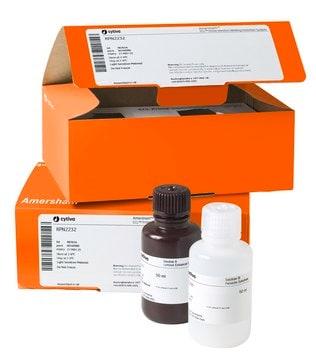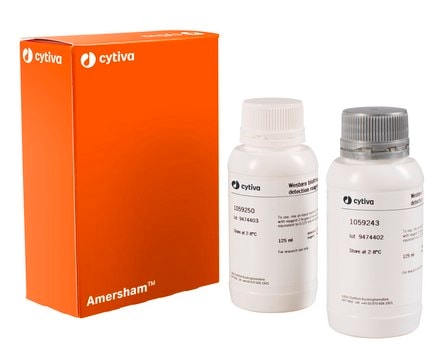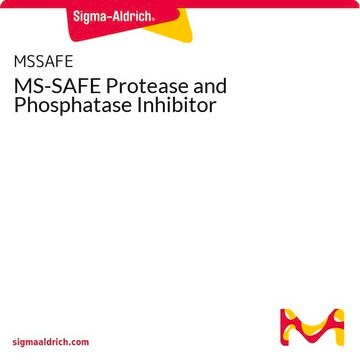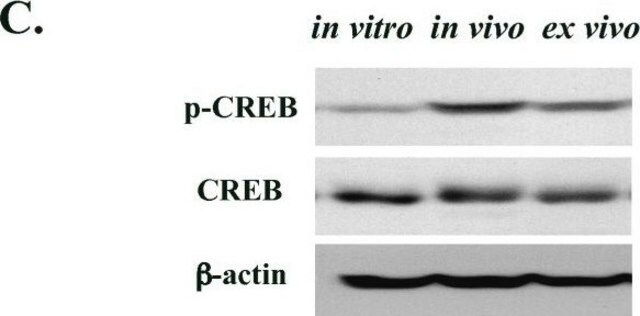GERPN3243
ECL™ Start Western Blotting Detection Reagent
Cytiva RPN3243, pkg of 200 mL
Sign Into View Organizational & Contract Pricing
All Photos(1)
About This Item
UNSPSC Code:
41105332
NACRES:
NA.32
Recommended Products
packaging
pkg of 200 mL
manufacturer/tradename
Cytiva RPN3243
storage temp.
room temp
Looking for similar products? Visit Product Comparison Guide
Related Categories
General description
Amersham ECL start is a chemiluminescent detection reagent in the Amersham ECL product family that is recommended for confirmatory analysis and detection of high to medium levels of endogenous proteins. Amersham ECL start has a long signal duration, which enables multiple exposures of the membrane, plus a convenient time window between experiment and analysis.
Application
ECL™ Start western blotting detection reagent has been used in western blotting.
Features and Benefits
- Flexibility: Long signal duration provides assay design flexibility and robust detection of large experimental sets.
- Low background: Produces low background, regardless of the method of detection.
- Stability of the working solution: The working solution is stable for 5 days.
- Long shelf life: A long shelf life of 18 months is convenient for those who run Western blots infrequently.
Storage and Stability
Please be aware this product may be shipped 90 days before the expiration date. For more information on the batch specific expiration date, please contact technical service.
Analysis Note
To view the Certificate of Analysis for this product, please visit www.cytiva.com.
Legal Information
ECL is a trademark of Cytiva
Storage Class Code
12 - Non Combustible Liquids
Flash Point(F)
Not applicable
Flash Point(C)
Not applicable
Choose from one of the most recent versions:
Certificates of Analysis (COA)
Lot/Batch Number
Sorry, we don't have COAs for this product available online at this time.
If you need assistance, please contact Customer Support.
Already Own This Product?
Find documentation for the products that you have recently purchased in the Document Library.
Customers Also Viewed
Grégoire Stik et al.
Nature genetics, 52(7), 655-661 (2020-06-10)
Three-dimensional organization of the genome is important for transcriptional regulation1-7. In mammals, CTCF and the cohesin complex create submegabase structures with elevated internal chromatin contact frequencies, called topologically associating domains (TADs)8-12. Although TADs can contribute to transcriptional regulation, ablation of
Sex- and Development-Dependent Responses of Rat Microglia to Pro- and Anti-inflammatory Stimulation.
Starlee Lively et al.
Frontiers in cellular neuroscience, 12, 433-433 (2018-12-14)
Addressing potential sex differences in pre-clinical studies is crucial for developing therapeutic interventions. Although sex differences have been reported in epidemiological studies and from clinical experience, most pre-clinical studies of neuroinflammation use male rodents; however, sexual dimorphisms in microglia might
Starlee Lively et al.
Frontiers in cellular neuroscience, 12, 115-115 (2018-05-22)
The cytokine, transforming growth factor β1 (TGFβ1), is up-regulated after central nervous system (CNS) injuries or diseases involving microglial activation, and it has been proposed as a therapeutic agent for treating neuroinflammation. Microglia can produce and respond to TGFβ1. While
Our team of scientists has experience in all areas of research including Life Science, Material Science, Chemical Synthesis, Chromatography, Analytical and many others.
Contact Technical Service















